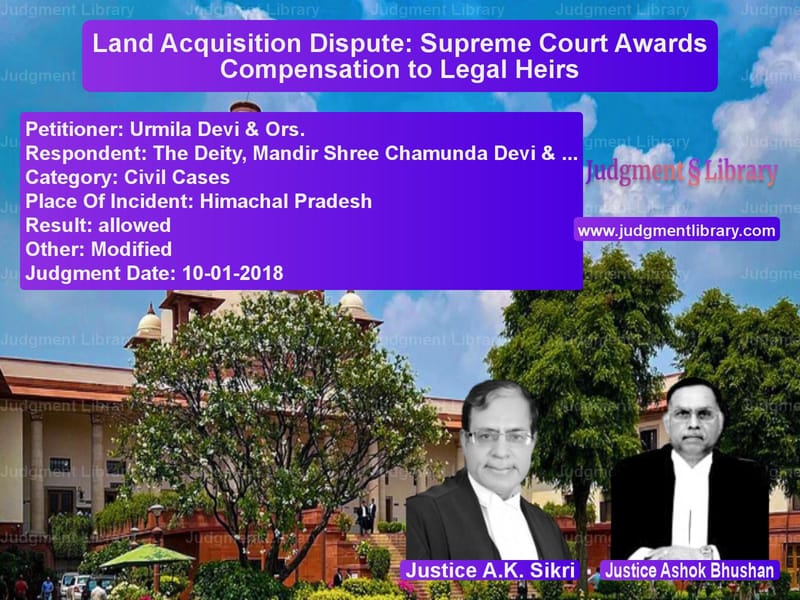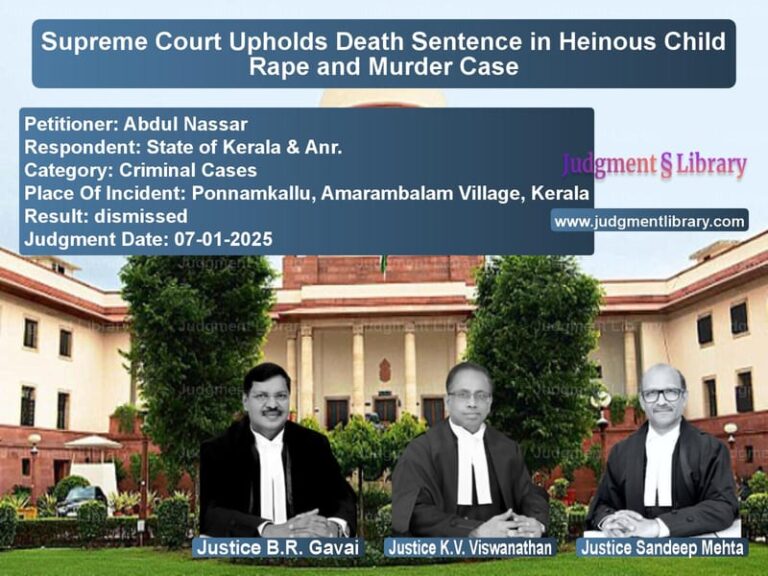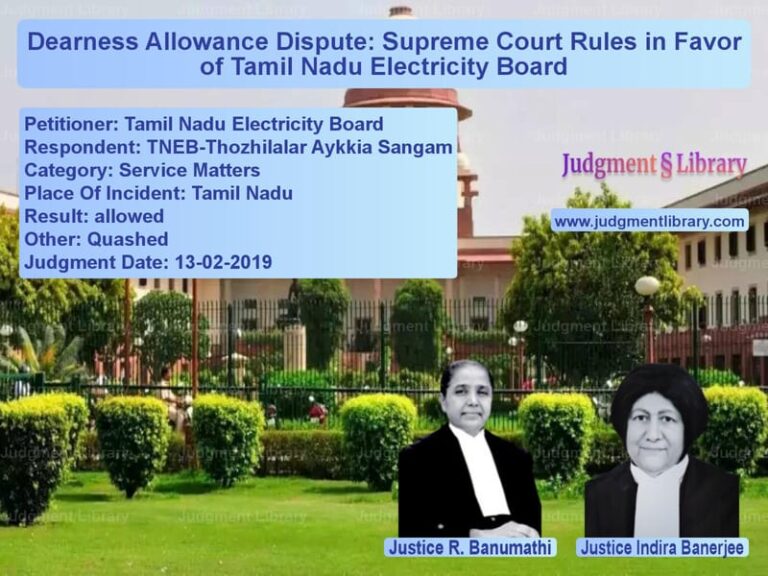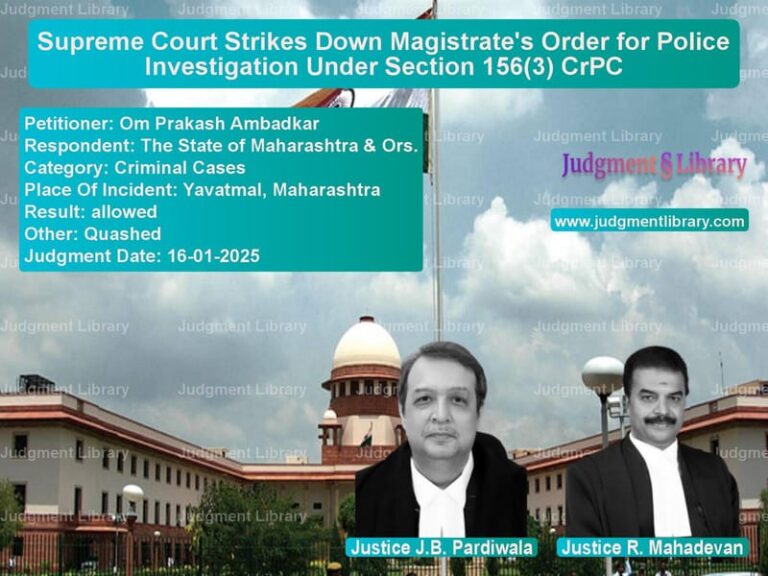Land Acquisition Dispute: Supreme Court Awards Compensation to Legal Heirs
The Supreme Court of India, in its judgment on January 10, 2018, ruled on a land acquisition dispute concerning the legal heirs of the original plaintiff. The case, Urmila Devi & Ors. v. The Deity, Mandir Shree Chamunda Devi & Ors., revolved around the enforcement of a sale agreement and compensation claims following land acquisition by the government. The Supreme Court modified the High Court’s ruling and directed the disbursement of compensation to the rightful parties.
Background of the Case
The dispute arose from an agreement to sell a piece of land in Himachal Pradesh. The original plaintiff, Krishan Lal, entered into an agreement to purchase a 5/16th share in a plot of land (Khasra Nos. 430 and 431) from respondents 2 to 6 for Rs. 90,000 on April 19, 1989. The sellers accepted full payment and handed over possession to the plaintiff, who subsequently constructed three shops on the property.
However, instead of executing a sale deed, respondents 2 to 6 executed a gift deed in favor of respondent 1 (the temple authority) on July 8, 1991. Aggrieved by this move, Krishan Lal filed Civil Suit No. 148 of 1991, seeking specific performance of the agreement. The trial court ruled in favor of Krishan Lal, declaring the gift deed null and void and ordering specific performance of the sale.
Respondent 1 (defendant no. 6) appealed to the Himachal Pradesh High Court. During the pendency of the appeal, the land was acquired by the government through a notification issued under Section 4 of the Land Acquisition Act on December 22, 2005. Consequently, an award was passed on June 10, 2008, compensating the landowners for the acquisition.
The High Court modified the decree, directing respondents 2 to 6 to refund Rs. 90,000 with 9% annual interest to the plaintiff instead of enforcing specific performance. Dissatisfied, the legal heirs of the plaintiff appealed to the Supreme Court.
Arguments by the Appellants (Legal Heirs of Krishan Lal)
The appellants contended that:
- The High Court erred in reducing the remedy to a mere refund of Rs. 90,000 when the plaintiff was legally entitled to receive compensation for the acquired land.
- The trial court had rightly ruled that the gift deed was void, and thus, the plaintiff was the rightful owner at the time of land acquisition.
- The compensation paid for the acquisition should be awarded to them rather than respondent 1 (the temple authority), as the latter had no legal claim over the land.
Arguments by the Respondents (Temple Authority & Sellers)
The respondents countered that:
- The High Court’s modification of the decree was justified since the land had already been acquired, making specific performance impossible.
- The compensation should be divided among the legal heirs of the plaintiff and the original sellers (respondents 2 to 6).
Observations of the Supreme Court
The Supreme Court examined the facts and made the following key observations:
- “The agreement to sell was executed with full consideration received, and possession was delivered in 1989. The plaintiff also made improvements on the land by constructing shops.”
- “The gift deed executed by respondents 2 to 6 in favor of respondent 1 was fraudulent and was rightly declared void by the trial court.”
- “Since the land was acquired and compensation was determined, the legal heirs of the plaintiff are entitled to receive compensation, not just a refund of the sale amount.”
- “Under Section 21 of the Specific Relief Act, if specific performance becomes impossible due to reasons beyond the plaintiff’s control, the court can award compensation in substitution.”
The Court also referred to the ruling in Jagdish Singh v. Nathu Singh (1992), where it was held that when land is acquired during the pendency of a specific performance suit, the compensation must be paid to the plaintiff instead of the seller.
Final Verdict
The Supreme Court modified the High Court’s ruling and ordered that:
- The legal heirs of the plaintiff (appellants) shall receive Rs. 10 lakhs from the compensation awarded for the acquisition of the land.
- The remaining compensation shall be paid to respondents 2 to 6 (the original sellers), provided they had legal claims over the acquired portion.
- If respondent 1 (the temple authority) had already received the compensation, it must refund Rs. 10 lakhs to the appellants and the remaining amount to respondents 2 to 6.
- If compensation has not yet been disbursed, the Land Acquisition Authority must distribute it as per the Court’s directions.
Conclusion
This ruling reaffirms the principle that plaintiffs who enter into valid agreements to purchase land and fulfill their obligations should not be deprived of compensation due to subsequent government acquisition. The judgment ensures fairness by awarding compensation to the rightful parties while preventing unjust enrichment.
Don’t miss out on the full details! Download the complete judgment in PDF format below and gain valuable insights instantly!
Download Judgment: Urmila Devi & Ors. vs The Deity, Mandir Sh Supreme Court of India Judgment Dated 10-01-2018.pdf
Direct Downlaod Judgment: Direct downlaod this Judgment
See all petitions in Property Disputes
See all petitions in Damages and Compensation
See all petitions in Judgment by A.K. Sikri
See all petitions in Judgment by Ashok Bhushan
See all petitions in allowed
See all petitions in Modified
See all petitions in supreme court of India judgments January 2018
See all petitions in 2018 judgments
See all posts in Civil Cases Category
See all allowed petitions in Civil Cases Category
See all Dismissed petitions in Civil Cases Category
See all partially allowed petitions in Civil Cases Category







